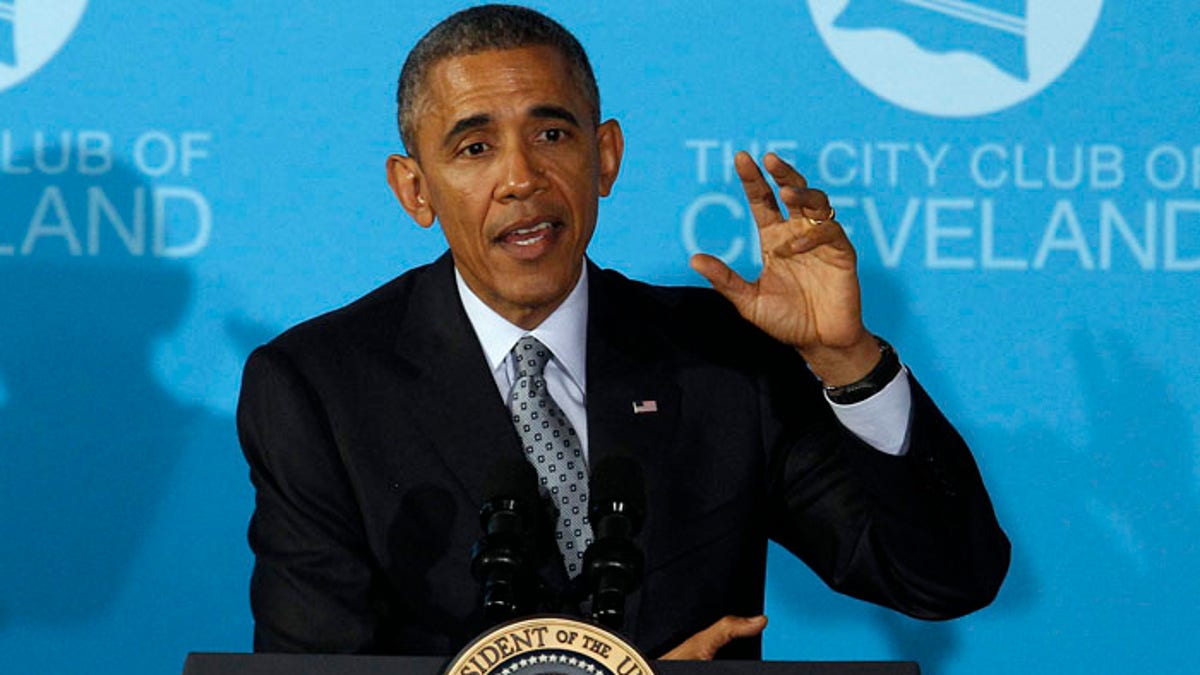
President Obama made the suggestion of mandatory voting, but seemed to realize the chances of it ever happening are slim. (AP)
Mandatory voting might be a big boon for the Democratic Party, but the idea President Obama floated this week of forcing Americans to show up at the polls and cast ballots is never going to happen, legal experts told FoxNews.com.
Obama made the comment while speaking to a civic group in Cleveland on Wednesday, noting that some countries require citizens to cast ballots in key elections.
"If everybody voted, then it would completely change the political map in this country," Obama said, calling it "potentially transformative." Not only that, Obama said, but universal voting would "counteract money more than anything."
"People have a right to opt out of elections. It's not happening."
But the Constitution guarantees the right not to vote, according to Rutgers School of Law Professor Frank Askin, an expert on election law. He said the right to free speech enjoyed by all Americans extends to making a constitutionally protected statement by not taking part in the election process.
“I don't think you can do it in this country because I don’t think the First Amendment would permit it," said Askin, who did say that automatic voter registration is a possibility. "People have a right to opt out of elections. It's not happening."
Voter turnout in the 2014 midterms was just 37 percent, according to the United States Election Project. Obama noted that universal voting would mean increasing the vote among the younger, poorer, less educated and more racially diverse segments of the population, a development that some experts believe might benefit Obama's Democratic Party.
At least 18 countries -- including Australia, Belgium, Egypt, Mexico and Turkey -- require all eligible citizens to at least show up on election day, according to the International Institute for Democracy and Electoral Assistance.
Such a movement could start with states or be done in Washington, but would undoubtedly face legal challenges, according to Michael Kang, a law professor at Emory University.
“It’s not that there’s lack of legal authority," he said. "It’s totally conceivable that you could have a law like that in theory.”
But, Kang added, "It's not happening."
Kang was also dubious that such a change in the law would benefit one party over the other.
“An interesting take on this is that you could imagine it would change campaigning a little bit – because everyone would have to show up. There wouldn’t be as much emphasis on that,” Kang said, suggesting that would be more likely to actually hurt the Democrats – not the Republicans.
Another scholar who agreed that a law requiring voting might pass constitutional muster was Michael McDonald, an associate professor of political science at the University of Florida.
“Absolutely states could do this on their own," McDonald said. "It could also be a federal law.”
McDonald said the likelihood is nil, but that he was not surprised Obama likes the idea.
“It’s not surprising to me that a Democrat would be making that argument," he said. "There are a number of surveys that have been done that demonstrate the massive people who tend not to vote are Democratic in nature.
“A wishful statement about Obama about having higher turnout is not something that’s going to lead to an executive order or even a state trying to implement a law like this. I think he was making a bit of a joke.”




